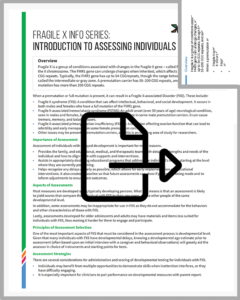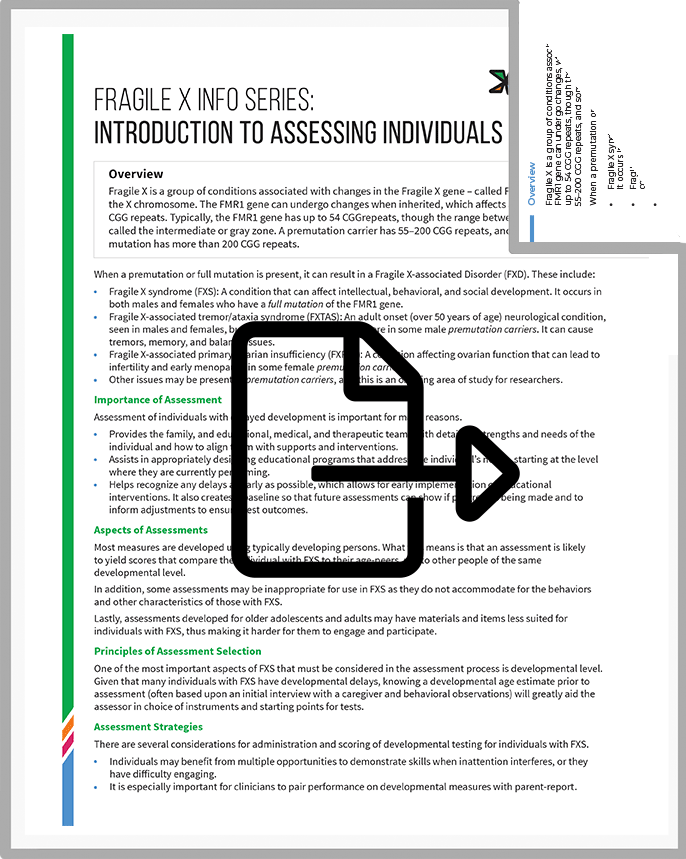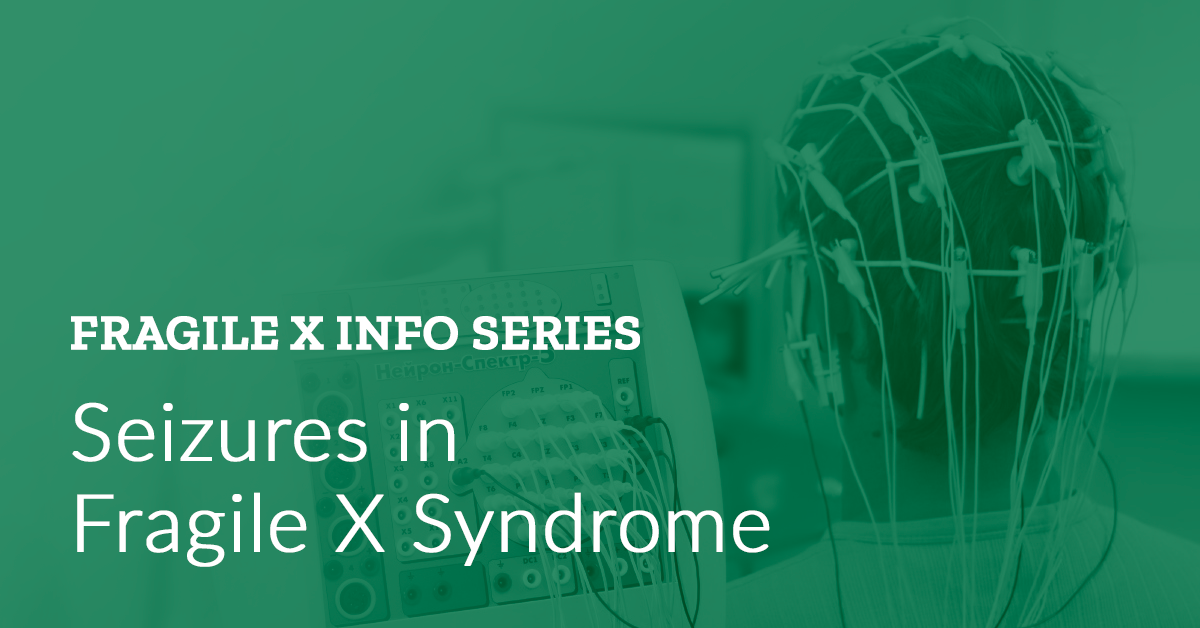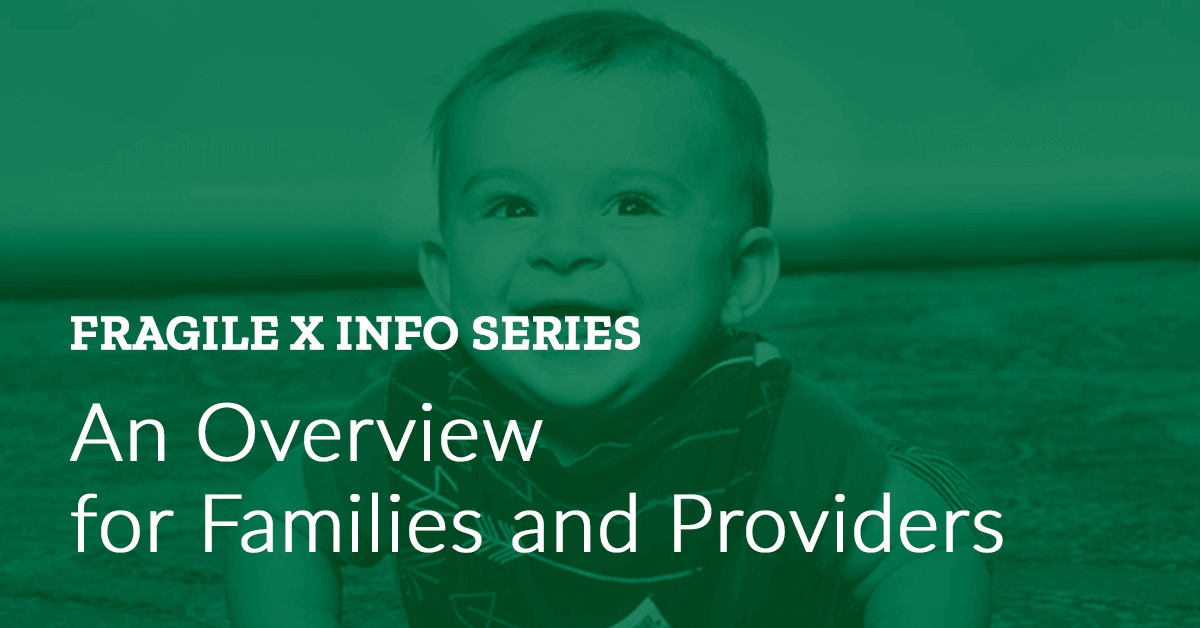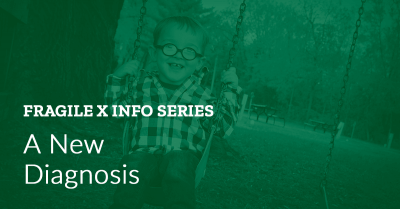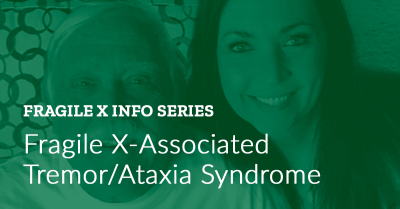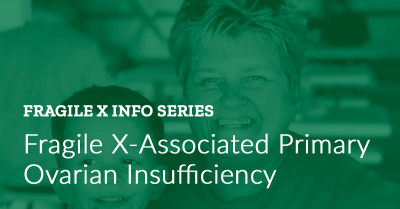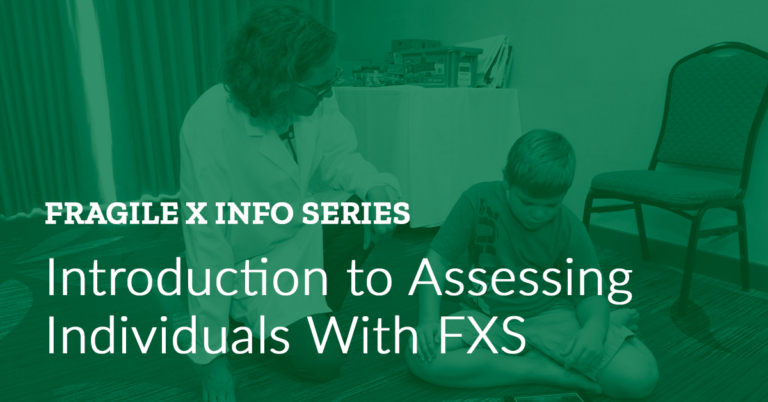Fragile X Info Series
Overview
Fragile X is a group of conditions associated with changes in the Fragile X gene — called FMR1 — located on the X chromosome. The FMR1 gene can undergo changes when inherited, which affects a pattern of DNA called CGG repeats. Typically, the FMR1 gene has up to 54 CGG repeats, though the range between 45 and 54 repeats is called the intermediate or gray zone. A premutation carrier has 55–200 CGG repeats, and someone with a full mutation has more than 200 CGG repeats.
When a premutation or full mutation is present, it can result in a Fragile X-associated disorder (FXD). These include:
FXS
FRAGILE X SYNDROME
FXS is an inherited disorder affecting intellectual, behavioral, and social development. It occurs in both males and females who have a full mutation of the FMR1 gene.
FXTAS
FRAGILE X-ASSOCIATED TREMOR/ATAXIA SYNDROME
FXTAS is an adult onset (over 50 years of age) neurological disorder, more common and more severe in males. It causes tremors, memory, and balance problems in those with a premutation of the FMR1 gene. (Both males and females who have a premutation are also referred to as “carriers.”)
FXPOI
FRAGILE X-ASSOCIATED PRIMARY OVARIAN INSUFFICIENCY
FXPOI is a condition affecting ovarian function that can lead to infertility and early menopause in some female carriers.
OTHER PREMUTATION CONDITIONS
Research is currently underway looking at various issues that may be seen in people with the premutation.
IMPORTANCE OF ASSESSMENT
Assessment of individuals with delayed development is important for many reasons.
- Provides the family, and educational, medical, and therapeutic teams with details of strengths and needs of the individual and how to align them with supports and interventions.
- Assists in appropriately designing educational programs that address the individual’s needs, starting at the level where they are currently performing.
- Helps recognize any delays as early as possible, which allows for early implementation of educational interventions.
- Creates a baseline so that future assessments can show if progress is being made and to inform adjustments to ensure best outcomes.
About Assessments
Aspects of Assessments
Most measures are developed using typically developing persons. What this means is that an assessment is likely to yield scores that compare the individual with Fragile X syndrome to their age-peers, not to other people of the same developmental level.
In addition, some assessments may be inappropriate for use in Fragile X syndrome as they do not accommodate for the behaviors and other characteristics of those with Fragile X syndrome.
Lastly, assessments developed for older adolescents and adults may have materials and items less suited for individuals with Fragile X syndrome, thus making it harder for them to engage and participate.
Principles of Assessment Selection
One of the most important aspects of Fragile X syndrome that must be considered in the assessment process is developmental level. Given that many individuals with Fragile X syndrome have developmental delays, knowing a developmental age estimate prior to assessment (often based upon an initial interview with a caregiver and behavioral observations) will greatly aid the assessor in choice of instruments and starting points for tests.
Assessment Strategies
There are several considerations for administration and scoring of developmental testing for individuals with Fragile X syndrome.
- Individuals may benefit from multiple opportunities to demonstrate skills when inattention interferes, or they have difficulty engaging.
- It is especially important for clinicians to pair performance on developmental measures with parent-report.
- Reporting on skills that are observed during an evaluation, but outside of the developmental test, may also provide a more complete picture of a child’s functioning.
- Individuals will likely benefit from clinicians moving between developmental tests to administer items. For instance, shifting between cognitive items (e.g., administering a puzzle item) and language items (e.g., identifying pictures in a book), often maintains engagement more effectively than requiring an individual to complete all items in a single test in consecutive order.
Such flexibility allows the assessor to follow a child’s lead, encourage sustained motivation and attention, and improves overall rapport. Note that, depending on the assessment/test, the examiner may not have the flexibility of changing order of items, and any change will likely be noted in the report.
Limitations of Assessments
One of the primary limitations of developmental testing is that results represent only a snapshot of a person’s full skillset.
It is often difficult for clinicians to fully capture the range of skills a person has based on a measure that is typically completed in 45-60 minutes.
It is especially important to pair results from developmental testing, as noted above, with caregiver-report.
Accommodations That Can Be Made to the Testing Process
- A visual schedule can be quite helpful.
- A practice or warmup period may be helpful.
- Initial testing items should be selected, and are already displayed when starting.
- Keeping a good pace is also important to reduce anxiety caused by waiting on the clinician to get materials organized and ready to proceed.
- Inserting breaks into testing, where access to favorite interests or preferred toys can be granted, may help to support motivation.
- Rewards.
When utilizing accommodations or “breaks from standardization” during testing, the key concept to keep in mind is to provide adjustments to the testing process if doing so will allow the person with FXS to demonstrate their ability and knowledge without altering the items or skills being measured.
Primary Domains of Assessment
- Cognition
- Behavior
- Social and Emotional Functioning
- Academic Skills
- Speech/Language/Communication
- Neuromotor Functioning and General Motor Functioning
- Sensory Processing and Adaptive Functioning
An Introduction to Assessing Children with Fragile X Syndrome
From our consensus-based treatment recommendations, a deeper look at clinical assessment of Fragile X syndrome.
Note: We also have a version for clinicians, providers, and other professionals (directly below).
Assessment of Fragile X Syndrome for Clinicians
From our consensus-based treatment recommendations, detailed recommendations for clinicians, providers and other professionals.
LEARN MORE
Early Intervention for Infants and Toddlers with Fragile X Syndrome
The early intervention program, known as Part C of the Individuals with Disabilities Education Act (IDEA), is a federal grant program that encourages states to set up programs for young children with disabilities and their families. Currently, every state has a Part C program.
How We Can Help
The NFXF is dedicated to serving the entire Fragile X community to live their best lives by providing the knowledge, resources, and tools, until, and even after more effective treatments and a cure are achieved. Learn more with Fragile X 101.
If you have questions please reach out to us at treatment@fragilex.org or call (800) 688-8765.


